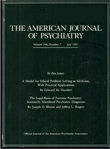Children eroticized by incest
Abstract
The assumption that children involved in incest are passive, unwilling victims is an oversimplification of a complex situation. Young children may find such relationships gratifying and, when exposed over time to intense genital and extragenital stimulation, they often become highly erotic. This hypermature responsiveness may be viewed as learned behavior; the behavior is self-reinforcing and may be difficult to modify. The author describes three children to illustrate their arousal, inability to differentiate sensual from affectionate touch, early gender discrimination, and stereotyped role modeling. Foster homes are neither trained nor supported in caring for these children, so serial placements are common.
Access content
To read the fulltext, please use one of the options below to sign in or purchase access.- Personal login
- Institutional Login
- Sign in via OpenAthens
- Register for access
-
Please login/register if you wish to pair your device and check access availability.
Not a subscriber?
PsychiatryOnline subscription options offer access to the DSM-5 library, books, journals, CME, and patient resources. This all-in-one virtual library provides psychiatrists and mental health professionals with key resources for diagnosis, treatment, research, and professional development.
Need more help? PsychiatryOnline Customer Service may be reached by emailing [email protected] or by calling 800-368-5777 (in the U.S.) or 703-907-7322 (outside the U.S.).



